#Representations of the characters
Text
Genuine question, where are yall getting the “robins eye dots + the stuff behind her are Xipe colors” from?
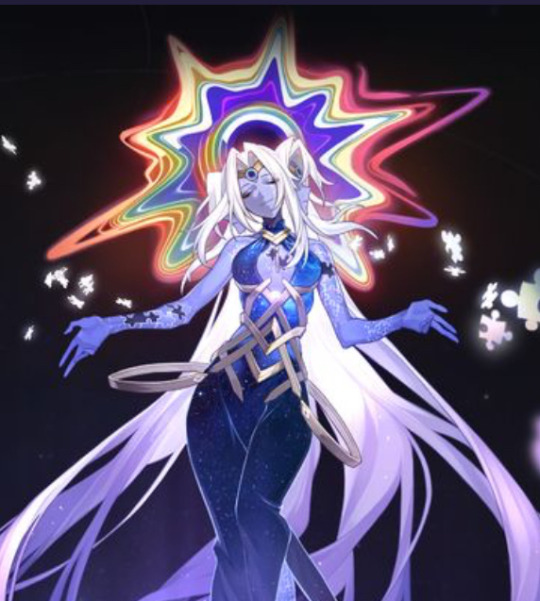
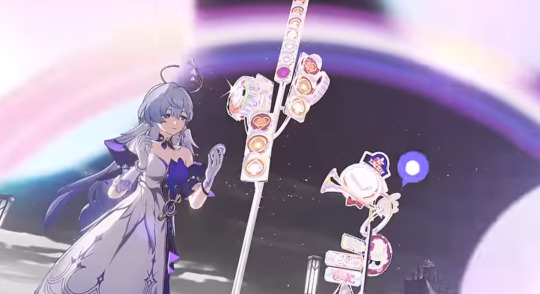
Because like I don’t see it, like at all. Xipe has like every color under the sun behind them and the shades aren’t similar to Robin’s at all, they aren’t in the same order and there’s like three million other colors mixed in there. I do think the “that rainbow behind her represents moon lesbians” is a little silly because even if it looks like the flag I doubt hoyo’s devs know what those are (I learned about them today 😭).
However, the other colors on the traffic lights and her cheeks straight up look like they are meant to look like a lesbian flag or at least a pastel version of one, and for the life of me I can’t see where people are coming from when they say it’s related to Xipe. I guess her eyes cover the other colors, but purple and yellow are still missing if she truly wanted to represent them on her face alone
Idk man, let me know your thoughts
#honkai star rail#hsr#penacony#robin hsr#robin#ik “erm colors” doesn’t really count as coding but if you combine it with everything else#It really does seem that they want Robin to be a lesbian or at least sapphic#However she did make a lot of flirty comments towards Boothill in the trailer#So ?!??#Might just be a Ruan Mei situation though#Bc apparently she made some flirty comments towards ratio in the 1.6 livestream#That doesn’t at all reflect her actual personality + ratiomei is ass#I mean the livestreams aren’t canon anyways#I don’t really think what Robin said was anything more than hoyo talking through her tbh#“Look at this cool cowboy#Maybe it’s a conflict of interest#Livestreams aren’t canon anyways and unlike demos they contain the least canonical version of a character#Its where the character Va really gets their time to shine#Honestly people need to realize that livestreams and demos and content like the concerts aren’t canon#As much as I love it#the Aventio interactions in avens demo didn’t literally happen even if they are accurate#Representations of the characters#and made to be in character as if it did happen#So canon but didn’t literally happen#It’s weird
26 notes
·
View notes
Text






Tutorial for drawing characters with cleft lip! Sorry that it's mostly unilateral-centric but it makes up the vast majority of resources and photos. Still tried to get tips for drawing bilateral clefts in though.
Keep in mind that this is an introductory drawing tutorial and has some generalizations in it, so not every “X is Z” statement will be true for Actual People 👍
If you draw any characters using this feel free to tag me!
#my art#disabled artist#artists on tumblr#digital art#id in alt text#art#personal art#queer artist#drawing tutorial#drawing tips#ccartshare#drawing disabled characters#disabled representation
35K notes
·
View notes
Text
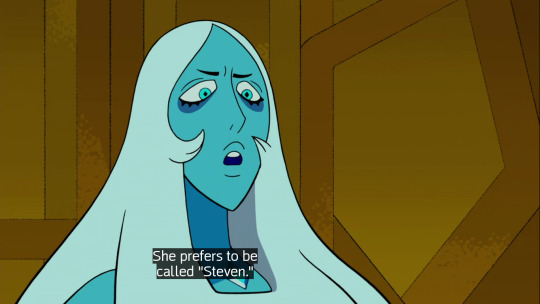
her pronouns are HE/HIM
#I do actually think it's neat on both a character and representation level#that steven only ever objects to being called rose/pink and never says anything about pronouns. however I think this is a funny joke.#steven universe#id in alt text#marina marvels at life
70K notes
·
View notes
Text
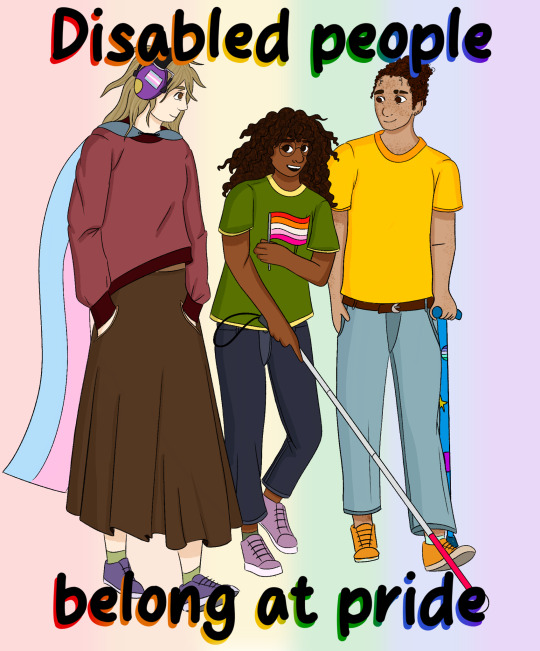

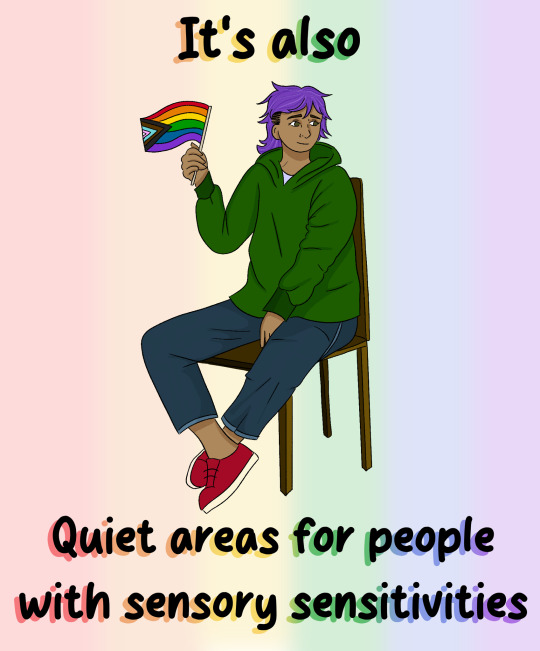
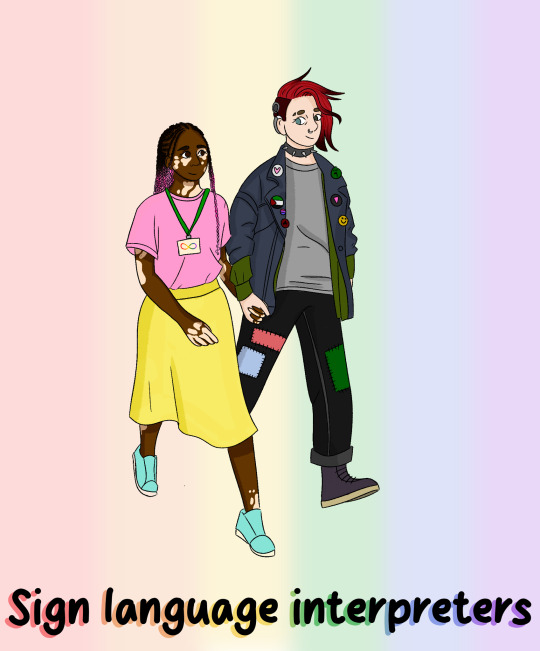
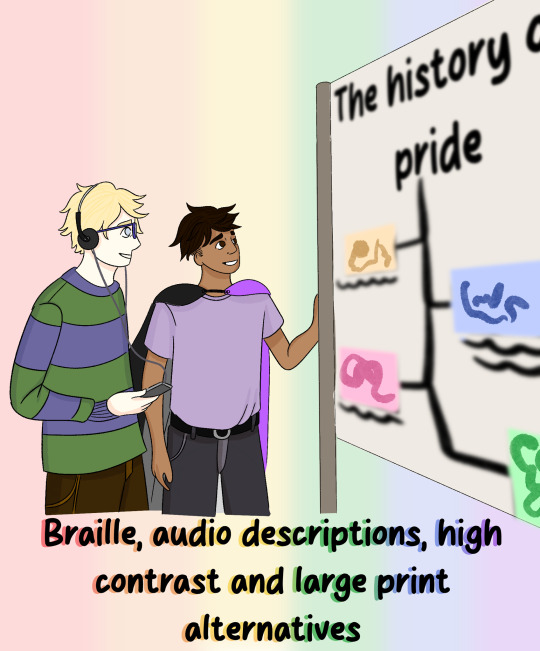

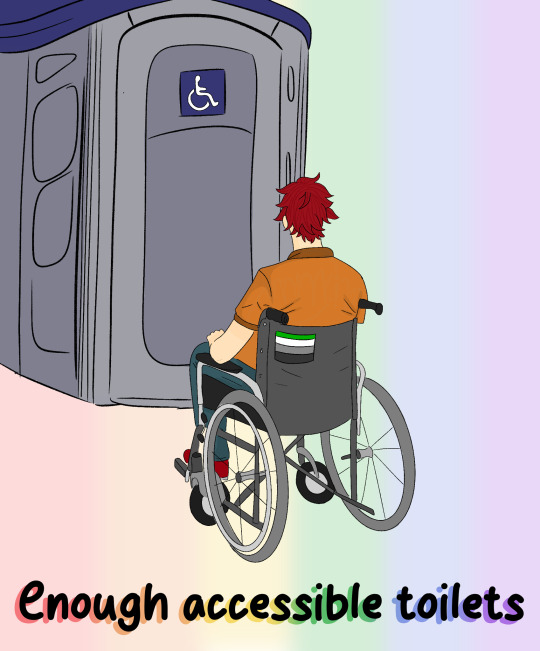
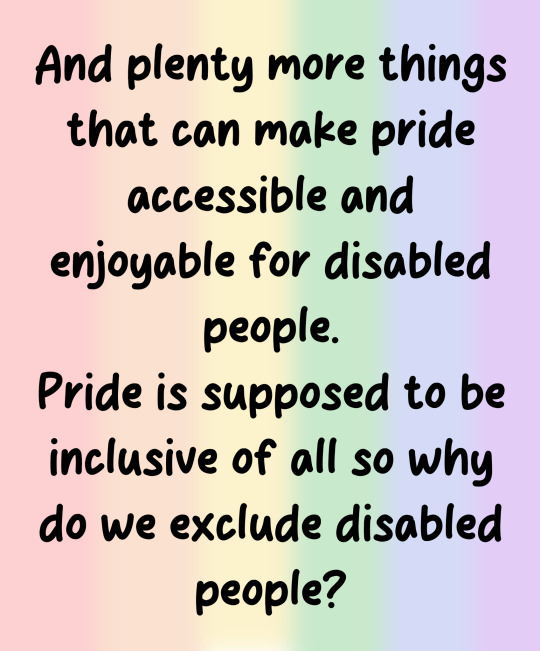
Make pride accessible for everyone!!!!
I made a post about this last year and the year before, and thought if I did it this way it gives people and orgs something to work towards. Often people forget that disabled people aren't just wheelchair users, and even those who are, need more than just that ramp!
My first ever pride, not only as a wheelchair but my first ever EVER pride, I went in expecting to feel at home.
Obviously I wasn't, I'm disabled, so why should I?
Instead there was just a ridiculous amount of uneven flooring, a steep ramp to the disabled toilet, no sanitary towel bin in the disabled toilet (???) no allowances to be let out of the festival to fetch things from my car, no where quiet and organisers who seemed genuinely surprised to see a wheelchair user!
My next pride, three years later, I was a seller, and while they had sorted their toilet problem (still no sanitary towel bin???), the hill to get in wouod have been genuinely impossible for me to get to if I hadn't been driving to get my stall in anyway, even with someone pushing me, no quiet areas, plenty of kerbs for me to get stuck at and again, genuine surprise.
Why is it so surprising to consider disabled people might be at pride? Not only do queer disabled people exist, but parents and family of queer kids and people, vendors and even entertainers!
Making pride accessible is crucial!
ID available in Alt Text
#art#queer#original art#artist#disabled rights#oc art#original character#disabled#disability#disability pride month#id in alt#id in alt text#image desc in alt text#queer cripple#gay#lgbt representation#lgbtq#lgbtqia#lgbtq community#lgbt pride#pride month#gay pride#gay pride month
20K notes
·
View notes
Text
the issue with shipping aro/ace characters isn't putting them into relationships, it's the fact that no one adds how their sexuality impacts the relationship at large. And how it'll always be different from your average romantic relationship in some way.
#aroace#aspec#aromantic#asexual#im aroace btw#aroace characters#ace characters#we deserve more representation for all types of relationships#not just whats the norm for romantic relationships#and people dont get that#I'm not asking for much#and it can add SO MUCH to a piece of fiction#and show that there is more than just one way to look at relationships
7K notes
·
View notes
Text




HAPPY PRIDE MONTH EVERYONE!!
#Undertale being the first game i saw to casually show lgbt representation#really changed my life haha#happy pride month#to Toby fox especially /j#art#undertale#pride month#undyne#alphys#sans undertale#papyrus#mad mew mew#napstablook#mettaton#wow lots of characters
8K notes
·
View notes
Text
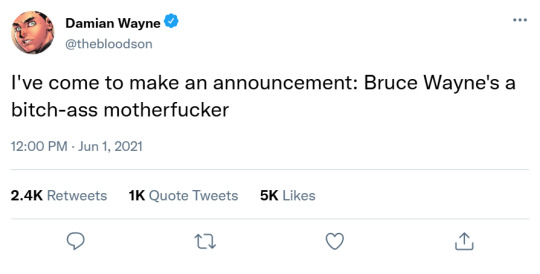
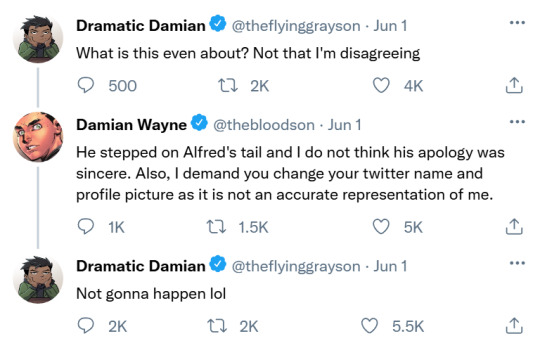
-
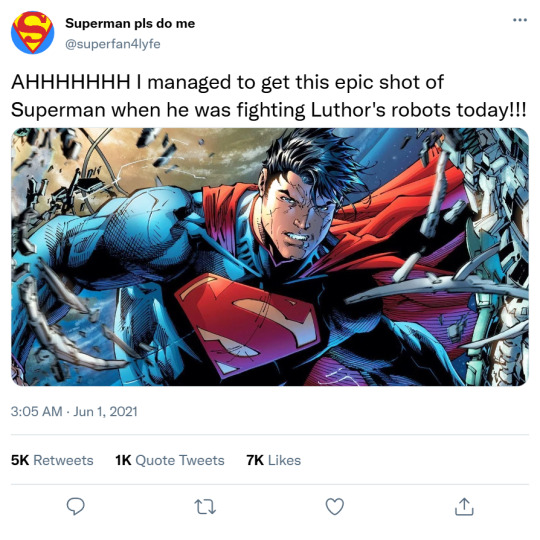
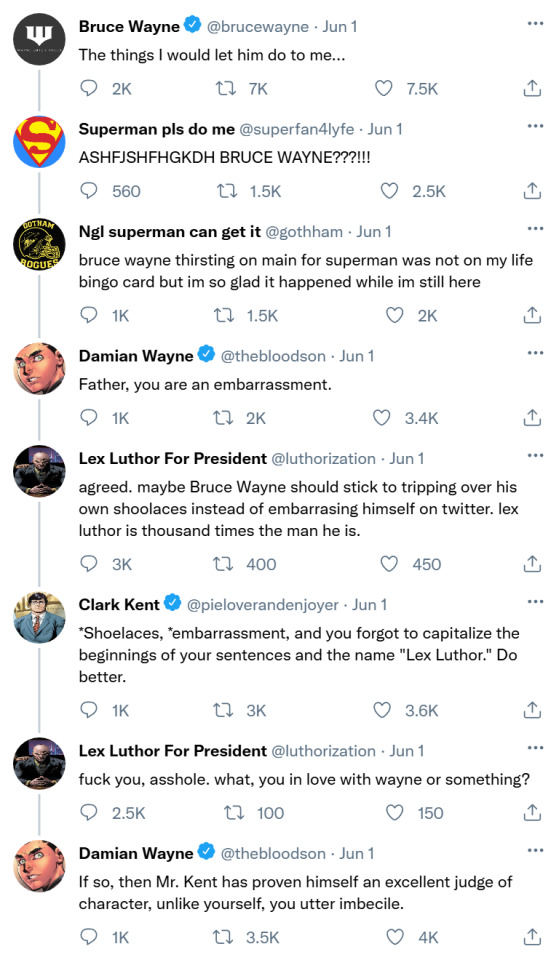
-
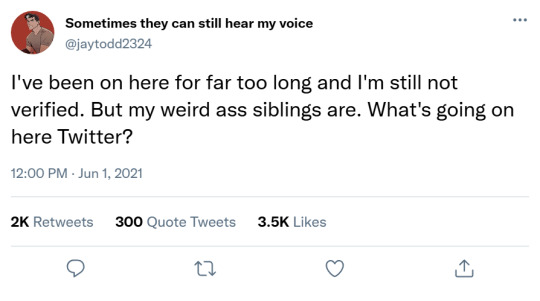
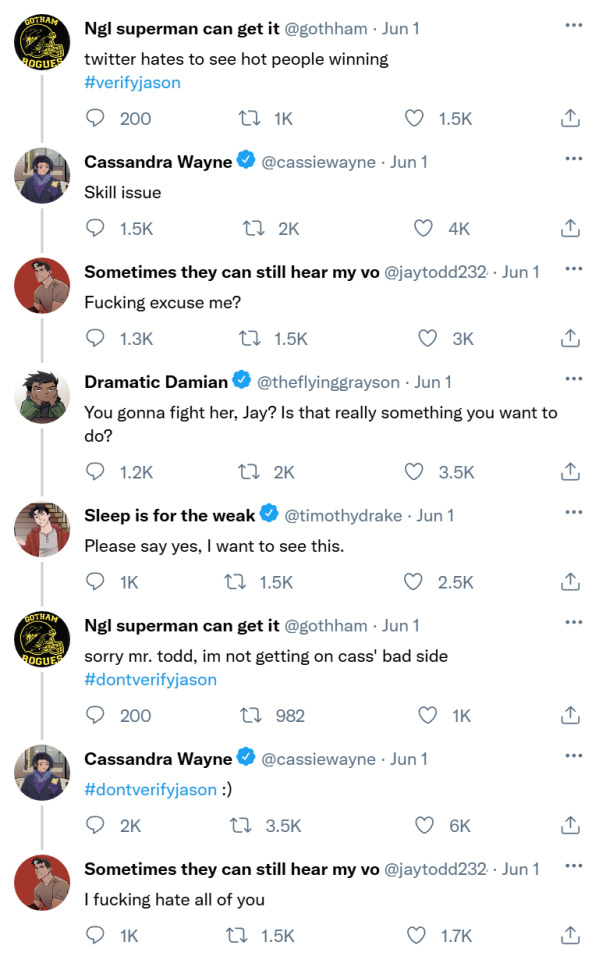
-
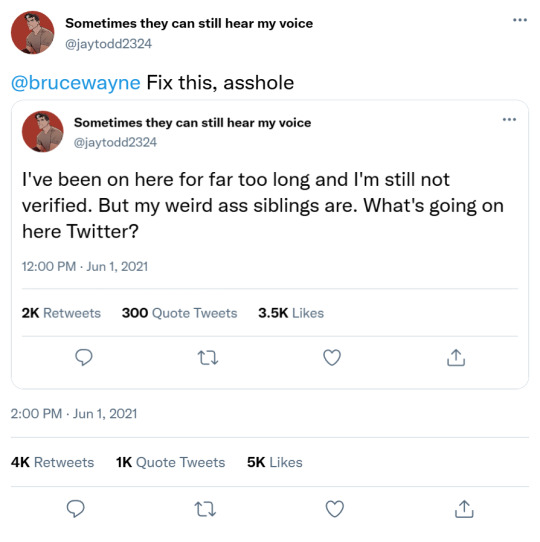
-
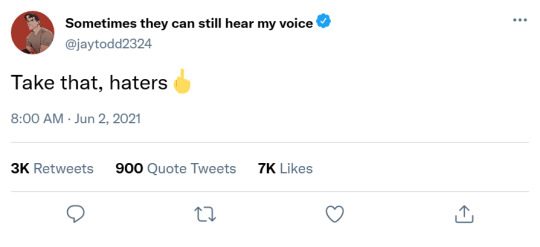
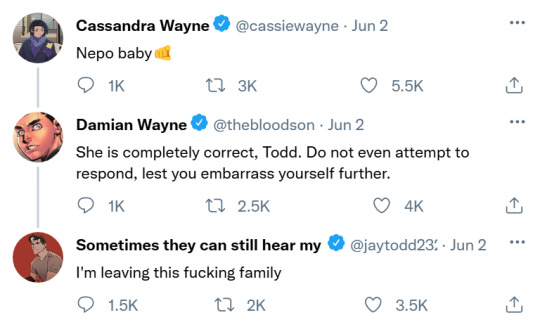
I tried something new
Part 1 -> Part 2
Masterpost
#DC#DCU#DC Comics#Dick Grayson#Damian Wayne#Bruce Wayne#Clark Kent#Lex Luthor#Nightwing#Robin#Batman#Superman#Superbat#Jason Todd#Red Hood#Cassandra Cain#Batgirl#Black Bat#Wayne Family Adventures#WFA#Damian's username isn't a representation of his character at all but rather a nod to that one DCAMU movie because I thought it was funny#Don't take it too seriously#Tim's username is based on that one comic panel I saw where he stayed up all night and Alfred found him like that#It just stuck with me and I wanted to honor it#Also Alfred here is Damian's cat Alfred
5K notes
·
View notes
Text
It's so genius that Inside Out 2 uses Anxiety as an antagonising character that opposes Joy, Sadness, Fear, Disgust and Anger without making her an antagonist, or villain. She is trying to protect Riley just like they are, but she is so caught up in her own ways that she doesn't see the bigger picture. And that's exactly what anxiety feels like.
When she realises this, it causes a panic attack (which is also beautifully depicted) and she spirals.
Anxiety is a genius character, and it is so important to me that the other emotions don't attempt to push her out of Headquarters or out of Riley's life but instead find ways of coping with her.
Because Anxiety shouldn't control your life, but she will still be in your life. And it is possible to live with anxiety.
#anxiety inside out#inside out 2#inside out#anxiety#maya hawke#spoilers#joy#fear#disgust#anger#sadness#embarrasment#envy#ennui#inside out anxiety#disney pixar#pixar#i am actually so obsessed with this#pixar nailed this narrative#and maya hawke was amazing#anxiety is so important to me#as a character#but the anxiety representation was also incredible
3K notes
·
View notes
Text
God the rogue proposal is going to live in my head rent free for a while. Rogue isn’t a good liar!! He doesn’t lie at all during the episode. Any deception or mystery around him is that he just doesn’t say much, and when he does, he doesn’t give details. That shit was genuine (because everything he does is genuine) and it throws the doctor (guy whose primary hobby is Lying) COMPLETELY off guard I’m going to think about it for a million years
#I’ve seen a lot of posts referencing rogue’s ‘facade’ or ‘act’ but he doesn’t lie!!! he’s bad at improv!!!#he’s just genuinely like this. he’s an introvert. he’s a fucking nerd.#representation for characters who can’t lie but are still Cool just like me for real#dw spoilers#doctor who rogue#Doctor who
3K notes
·
View notes
Text
Just a reminder that unless your amputee character lost their limb less than a month ago, their stumps don't need to be bandaged.
#ive been seeing a lot of people's chatacters on artfight who have bandaged stumps so i thought it worth a quick reminder#this goes for you too Dragonage Fandom - your inquisitor doesnt need a bandage on their arm when you draw them interacting with Rook lol#there are exceptions of course but there are very few reasons for your oc who lost their arm 10 years ago to still be bandageing it#i have a longer post about this if you want to know more - its one of the first posts on this account#amputee#amputee representation#disability representation#disability in media#amputee character
2K notes
·
View notes
Text
Hey you know what's super funny about the idea of "good bi rep"?
For a character to be canonically bi you have to make sure and establish that they're attracted to multiple genders. Not all mediums allow you to get inside every character's head or show what they're thinking. Flirting can be read ambiguously, and god forbid they flirt with a character who's not into them and be read as pushy or predatory. So it can be super handy to just mention an ex or two! But you better not mention too many exes because that would make them a slutty bisexual which is (checks notes) bad, and you definitely better be careful about making them poly, because that might make them, uh... greedy. Oh, and those exes? They better be perfectly amiable breakups with no conflict or drama, because it's bad to represent queer people in toxic or abusive relationships (especially queer women! very bad), and you definitely can't have them have lost a partner if the partner was queer because that's "bury your gays..." You should probably also eliminate all trauma from their backstory, just to be safe. You should probably also make sure they're not involved in crime, deception, or anything of the sort, because that would make them "deviant" and a stereotype.
But don't worry! Once you've carefully crafted your nice, monogamous, experienced-but-not-too-experienced Lawful Good bi character, you will be rewarded with your audience deeming them "boring" and quickly passing them over for other characters. :)
#writing#lgbtqa+#bisexual representation#fandom problems#gwaren exports#because if you're paying attention you can probably recognize some characters in here
22K notes
·
View notes
Text
Happy Face Equality Week :-D
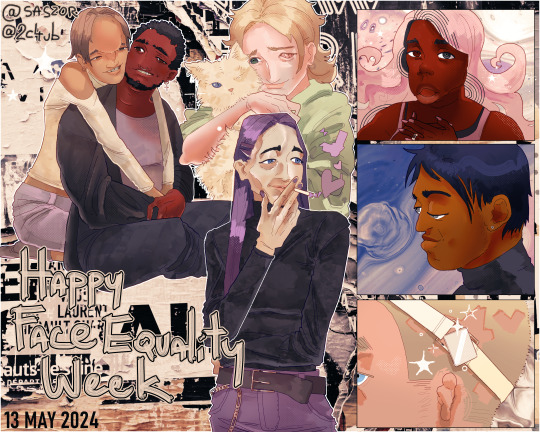
(short ID in alt text, longer below)
I really wanted to draw some happy people with facial differences for this week so:)
if you tag this as "tw scars" or some other "body horror" I'm killing u btw:D!!!
[Image description: digital drawing of 7 character with facial differences against a patterned background. The left side shows a gay couple sitting and hugging; one from them has a large bump on his forehead and widespread eyes, while the other has paralysis on one side of his face. In the middle is a teen girl cuddling with a cat, both of which are missing their left eye. Below her is a nonbinary person smoking a cigarette with heart-shaped smoke surrounding them; they have facial atrophy on one side of their face. The right side is split into three small panels; top one shows a Black girl with a cystic hygroma on her jaw on a pastel pink background, middle shows an Indian man with Crouzon syndrome from the side smiling, bottom is a zoom on the side of the head of a person with microtia; they're wearing a bone-anchored hearing aid and have a buzz cut with stars patterned in it. At the bottom, "Happy Face Equality Week" is written. End image description.]
#my art#disabled artist#artists on tumblr#digital art#disabled ocs#personal art#art#queer artist#described art#facial difference#face equality week#face equality#disabled art#disability positivity#disability pride#disabled characters#disability representation#digital artist#body positive art#small artist#original art#illustration
3K notes
·
View notes
Text
I am actually a Native person who has always gone by animal names, both my deadname and every name I've used as a trans person, and I think if you have a Native character who you feel would have a nature name (because of hippy parents or because they're trans or whatever), then you can avoid stereotypes by having ~more than one Native character~
I know, it's a shocking concept, but it's actually pretty easy to avoid contributing to stereotypes in your works when you remember that you are allowed to have more than one character from the same ethnic and/or racial group. Just have a different Native character with a "normal" name. Problem solved. Have fun.
#obviously it's more complicated than this in some ways#but a lot of it really does come down to using one character as a representation of an entire ethnic group
3K notes
·
View notes
Text

A new critter!!! I have finally figured out what the Bonster looks like.

They're some kind of frog creature with horns and tusks... or is it fluff?! Hard to tell. Their hat is really a big tail they can cook things in and also WHAP against the ground when they're mad!!!
They're slightly smaller than the other critters. Here's a Fritter for scale:

#YAAAAYYY!!! They went through like... actually lemme count... 12 drafts!!! Before i got it#It finally clicked when i realised i was trying to hard to make them look like a real animal when theyre just meant to be a#miniature representation of the character. and thus: SCRUFFY!!! SMOL! THINGY!#credits to @kaimiiru-creations for coming up with the name Bonster. i couldn't stop thinking about it for months#Maybe I'll make a Nille critter someday. We'll see :) Odile first. hopefully#isat#in stars and time#isat bonnie#my art
1K notes
·
View notes
Text
Write more Deaf characters!
[Large Text: Write more Deaf characters!]
When answering questions about deaf and hard of hearing characters, I have noticed they are overwhelmingly about:
A character who is deaf in one ear or hard of hearing because of an accident
A character who was born deaf and knows sign language, but seems to have 0 connection to the broader Deaf community
This is not the experience of most d/Deaf people! So, here's your primer to Deaf community and culture, and writing a Deaf character, because they are sorely underrepresented.
(Disclaimer: this post was written using viewpoints I, a singular Deaf person in the United States, have encountered. I tried to make this as general as possible to encompass many Deaf views, but it is possible that I have misconstrued something. Do not take this guide as the be-all and end-all of your knowledge on Deaf culture. Keep reading and researching the Deaf community, and explore viewpoints from many different Deaf people of all backgrounds.)
Why do you write Deaf with capital D?
[Large Text: Why do you write Deaf with capital D?]
The term "deaf" with the lowercase d means not being able to hear. The term "Deaf" with an uppercase D refers to the cultural identity formed by deaf people. This identity is difficult to explain but it includes knowing sign language and engaging with other Deaf people.
There are varying opinions within the Deaf community on who is allowed to call themselves culturally Deaf. Some Deaf believe that only those who were born into the Deaf community (whose family is Deaf, who attended a Deaf school, and/or who have sign language as a first language) are allowed to consider themselves culturally Deaf. On the 'flip' side, some Deaf believe that anyone with hearing loss can claim the label. And of course, you can find someone Deaf with any opinion in between.
This is all intracommunity nuance. If your character is born deaf and learns sign language at a young age or as a first language, they are likely culturally Deaf.
Sign Language Use
[Large Text: Sign Language Use]
Sign languages are the language of Deaf communities. (Note that there are many sign languages in different regions, and they are not related in the same way spoken languages are!)
Most sign languages did not originate alongside spoken language, either, so they usually have different grammar than the spoken language in a region. This means that someone whose first language is sign may have difficulty learning even the written version of the spoken language due to the different grammar and translation. For native signers, the spoken language of their area is their second language.
Sign languages are fully developed languages, with grammar and structure. Sign language is not "less" than spoken language, and encouraging sign language does not discourage speech. (Even if it did, that's not a bad thing! Sign languages are still a valid and rich communication form!) Sign languages have slang and expressions/idioms too.
Sign languages typically have a "manual alphabet" otherwise known as "fingerspelling". This is a way to represent words that don't have a sign. Fluent signers very rarely fingerspell; normally fingerspelling is for proper nouns which don't have a name sign.
Name signs are the last big point I want to cover about sign language. A name sign is a way to refer to someone so you don't have to spell their name every time. It's usually related to someone's attributes, like dimples or a specific way of moving. Sign names can only be given by Deaf people who are fluent in sign language.
Deaf Education
[Large Text: Deaf Education]
For a long time, deaf people were considered unable to learn, just because they couldn't hear. And since 1880, for about 100 years and even still today, the prevailing tradition in deaf education was/is oralism--a teaching method based on speech that rejects sign language.
Historically speaking, if deaf children were to receive an education, they would be sent to a Deaf residential school. These still exist, although there are also many Deaf schools that are typical day schools, just for d/Deaf/hoh students.
Deaf children may also attend "mainstream" schools; they might have sign language interpreters and other accessibility accommodations, or they may be forced to rely on lipreading and context, or placed in special education where their needs often still are not met.
Oralism still has lasting effects today. Deaf people have received, and still do receive, worse education than hearing people.
One common problem is language deprivation. Many deaf children grow up without access to sign language. About 90% of deaf people are born to hearing parents; even if hearing parents do send their deaf kids to a Deaf school, they may not learn sign language themselves, so the child must rely on what they can gather of spoken language at home. Sign language is even discouraged by some audiologists and speech professionals, because it "might interfere with speech". But by depriving deaf children of sign language, more often than not, they are being deprived of all language.
People who are born deaf do not learn spoken language naturally, even when provided with aids like hearing aids and cochlear implants. Many deaf kids who learn speech learn it through extensive speech therapy, and often have a "deaf accent" from copying mouth shapes but not being able to hear or process what sounds they are making, which may also include having an atypically pitched voice (e.g., very high-pitched). Lip-reading is inaccurate and the best lip-readers can only follow about 30% of a conversation, and that's by intently watching with no breaks.
It is possible to learn a language at any age. But it is easiest to pick up a new language when one is young. Children who do not learn a first language by around age 5--the age at which they would start school--have more difficulty learning any language, and may have frequent outbursts or trouble expressing emotions as a result of communication difficulties.
Another problem, especially within the Deaf community, is literacy. Spoken languages are often unrelated to the signed language of the same region. Learning to read and write, as a Deaf child, is like learning a whole new separate language, with different grammar and structure than their native language. This is why captions are not a perfect accessibility tool--it is, for many Deaf people, being offered an alternative in their second language, if they have learned to read and write at all.
Deaf Culture Norms
[Large Text: Deaf Culture Norms]
To hearing people, Deaf conversation can seem very blunt and to the point. This isn't to say Deaf people are inexpressive--quite the opposite: sign languages often use facial expressions as part of the grammar, and there is a lot of expression that can be incorporated into a sign--but there isn't a lot of "talking around" things. You can see part of this culture in name signs, which are usually based off a trait of the person. It's not offensive--it's just how they're recognized!
Another conception is of Deaf people being over expressive, but again, that is just part of sign language grammar. Face and body movements take the place of tone of voice, as well as other grammatical clarifications.
Deaf people talk a lot! It's very hard to end a conversation, because there will always be something else to say or a new person to meet. Hugging and other physical touch are really common greetings.
Tapping people on the shoulder to get their attention is fine. Other ways include flicking the lights or rattling a surface (for vibrations). Eye contact while signing is also important to make known that you are listening. Groups of Deaf people will sit in a circle so everyone can see everyone else. It's rude to talk in a Deaf space. If you are lost in the conversation, you'd ask if you can write or type instead.
Deaf Space also refers to design concepts that are more accessible to deaf people. This includes good lighting, minimal signing-height visual obstacles (e.g., low waist-height shelves), visual indicators instead of bells, open spaces so people can sit in a circle to talk, and automatic doors and wide hallways/passages so it is easier to continue a conversation while walking.
It's also very rude to comment on a Deaf person's voice. Do not mention you're surprised they can speak. Do not call their accent "cute" or "weird" or anything like that. Do not ask them to speak. Do not say their voice sounds really good ("for a deaf person") or that you wouldn't be able to tell they are deaf.
Deaf Views on Deafness
[Large Text: Deaf Views on Deafness]
The Deaf community is incredibly proud of their Deafness. You'll often hear the phrases "hearing loss = deaf gain" or "failing a hearing test" as "passing the deaf test". Continuing the Deaf community and culture is highly valued, and learning sign language is encouraged for everyone.
Many people in the Deaf community dislike cochlear implants as their success is incredibly variable and they require invasive surgery and therapies from a young age. Another big argument against CI is that they are often presented as the only or the first option to hearing parents, who misunderstand CI as a "cure" and then do not give their child access to sign language.
Deaf people also reject any sort of cure for deafness, especially genetic therapies. Many Deaf people do not think of their Deafness as a disability.
(Deaf people will often point out the advantages of Deaf culture and sign language, such as being able to talk over long distances, through windows, and even underwater.)
Most hard of hearing and some deaf people have hearing aids, although it is really an individual choice whether or not to wear them. Many d/Deaf/hoh people are overwhelmed and startled very easily by noise (since they're not used to that much auditory input) and get tinnitus from auditory overstimulation. They may also struggle with auditory processing--locating sounds, interpreting sounds, recognizing and interpreting speech, and other issues.
The Deaf community doesn't have any general complaints about hearing aids, just many prefer not to wear them. Do know that they are an imperfect aid; they just amplify sound, which doesn't improve processing or understanding, and it doesn't make people hearing. Not everyone even benefits from hearing aids--their specific hearing levels may make hearing aids a bad choice of aid.
A big point you'll hear in Deaf spaces is Deaf Can (and Deaf Power). Hearing people have historically treated deafness as a sign of incapability, but Deaf people can do everything hearing people can--except hear.
Myth Busting
[Large Text: Myth Busting]
Myth #1: All Deaf people are completely deaf. This is very far from the truth! Most deaf people have some degree of residual hearing, although this may require very loud sounds and/or at very specific pitches. Plus, there are many culturally Deaf people who are not deaf/hoh at all--CODAs, hearing children born to Deaf parents, are part of the Deaf community.
Myth #2: (Non-speaking) Deaf people do not make noise. Also very far from the truth! First off, Deaf people laugh. Many Deaf people also vocalize without knowing or intending, especially when excited. We can get very loud!
Myth #3: (Speaking) Deaf people talk loudly. While this can be true, often d/Deaf people talk more quietly than expected. This is because with severe to profound levels of deafness, no speaking volume is really going to be audible, so they will often rely on feeling vibrations in their throat to know if they're making noise. Vibrations are detectable at lower volumes than hearing people like to listen to.
Myth #4: Deaf people can't drive. I actually have no idea where this one came from but it's false. Deaf people can absolutely drive, and tend to have a lower rate of accidents and violations than hearing drivers. There is a common trend of treating d/Deaf people like they can't do things unrelated to hearing, but deafness on its own only affects hearing.
Deaf Struggles in the Hearing World
[Large Text: Deaf Struggles in the Hearing World]
A huge problem is just basic accessibility. Many places do not have captions or visual indicators, or rely on hearing (like drive-throughs). Movie open caption screenings are often at awkward times, and caption glasses are hard to find or access and awkward to wear.
Deaf people are also at increased risk of police violence. Police often treat signing as aggression, rather than attempts to communicate. When they yell, talk quickly, or shine a flashlight in Deaf people's faces, it's even harder to understand what is going on. Deaf people are also not often provided with a qualified interpreter and may not understand what is going on or why they were arrested.
Deaf people, specifically those who are mainly kept in the hearing world, have higher rates of drug use and addiction.
Hearing people also treat Deaf people as incapable or lesser. Gallaudet University had only hearing presidents until 1988 after the Deaf President Now protests; then-chair of the board at GU said in a statement that received heavy backlash from the students, "deaf people cannot function in the hearing world".
When writing your Deaf character:
[Large Text: When writing your Deaf Character:]
Were they born to hearing parents or to Deaf parents? (90% of deaf children are born to hearing parents.) Is anyone else in the family d/Deaf?
At what age was their deafness noticed? (It can be at birth, or it can take several years, even for children born deaf.) Is their hearing loss progressive? Is their hearing loss significantly different in each ear?
Were they eligible for cochlear implants? Did they get CI? Did they get hearing aids? (Consider cost as a factor: CI requires the surgery as well as intensive speech therapy; hearing aids are also expensive and can need replacement and refitting.) How well do the aids work for them? Do they have them in one or both ears?
What advice did their family receive from audiologists and speech therapists about sign language and communication, and did their family listen? Did they learn sign language? At what age? Did their parents and family learn sign language? Are they language-deprived? Did they go through speech therapy? What is their speech like? Do they like using their voice?
Did or do they attend Deaf school? Is it residential or day school? If it's residential, did they understand what was happening when they were dropped off? Does the school use sign language or rely on oralism? (Consider time period; most schools now use sign language, but from 1880-about 1980 the predominant method was oralism.)
If they don't attend a Deaf school, what accommodations are they receiving in mainstream setting? Are they in special education? Are they in a Deaf program at a mainstream school? Do they have an interpreter? How much do they understand what is going on in class?
How involved are they in Deaf community and culture? Are their friends and family involved and supportive of the Deaf community? Do they treat deafness like something to cure? Do their friends and family frequently ignore or "forget" that they are deaf?
In general, consider their scenario, what ableism they've faced, and what their Deaf identity is.
Happy writing, and please continue to send in your questions!
Mod Rock
#mod rock#writing guide#writing resources#deaf character#cultural deafness#sign language representation#long post
2K notes
·
View notes